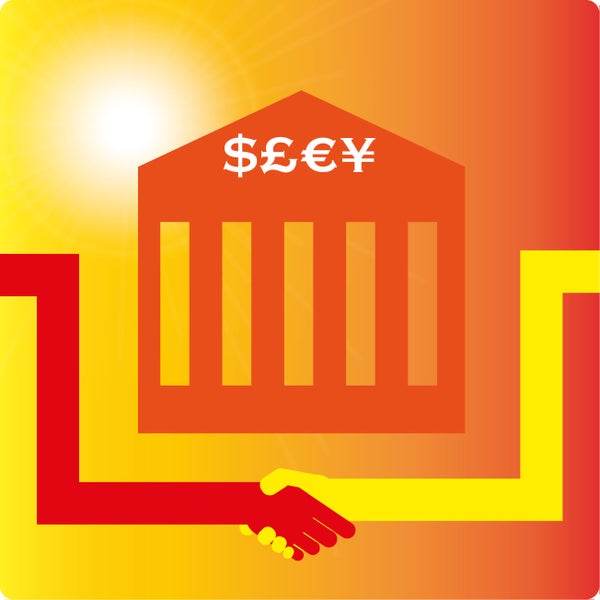Editor's Note: This article is part of a special report on the Top 10 Emerging Technologies of 2016 produced by the World Economic Forum. The list, compiled by the Forum’s Meta-Council on Emerging Technologies, highlights technological advances its members, including Scientific American Editor in Chief Mariette DiChristina, believe have the power to improve lives, transform industries and safeguard the planet. It also provides an opportunity to debate any human, societal, economic or environmental risks and concerns that the technologies may pose prior to widespread adoption.
Blockchain, the technology behind the bitcoin digital currency, is a decentralized public ledger of transactions that no one person or company owns or controls. Instead, every user can access the entire blockchain, and every transfer of funds from one account to another is recorded in a secure and verifiable form by using mathematical techniques borrowed from cryptography. With copies of the blockchain scattered all over the planet, it is considered to be effectively tamper-proof.
The challenges that bitcoin poses to law enforcement and international currency controls have been widely discussed. But the blockchain ledger has uses far beyond simple monetary transactions.
On supporting science journalism
If you're enjoying this article, consider supporting our award-winning journalism by subscribing. By purchasing a subscription you are helping to ensure the future of impactful stories about the discoveries and ideas shaping our world today.
Like the Internet, the blockchain is an open, global infrastructure upon which other technologies and applications can be built. And like the Internet, it allows people to bypass traditional intermediaries in their dealings with each other, thereby lowering or even eliminating transaction costs.
By using the blockchain, individuals can exchange money or purchase insurance securely without a bank account, even across national borders—a feature that could be transformative for the two billion people in the world currently underserved by financial institutions. Blockchain technology lets strangers record simple, enforceable contracts without a lawyer. It makes it possible to sell real estate, event tickets, stocks and almost any other kind of property or right without a broker.
The long-term consequences for professional intermediaries, such as banks, attorneys and brokers, could be profound—and not necessarily in negative ways, because these industries themselves pay huge amounts of transaction fees as a cost of doing business. Analysts at Santander InnoVentures, for example, have estimated that by 2022, blockchain technology could save banks more $20 billion annually in costs.
Some 50 big-name banks have announced blockchain initiatives. Investors have poured more than $1 billion in the past year into start-ups formed to exploit the blockchain for a wide range of businesses. Tech giants such as Microsoft, IBM and Google all have blockchain projects underway. Many of these companies are attracted by the potential to use the blockchain to address the privacy and security problems that continue to plague Internet commerce.
Because blockchain transactions are recorded using public and private keys—long strings of characters that are unreadable by humans—people can choose to remain anonymous while enabling third parties to verify that they shook, digitally, on an agreement. And not just people: an institution can use the blockchain to store public records and binding promises. Researchers at the University of Cambridge in the U.K., for example, have shown how drug companies could be required to add detailed descriptions of their upcoming clinical drug trials to the blockchain. This would prevent the companies from later moving the goalposts if the trial did not pan out as anticipated, an all-too-common tactic. In London, mayoral candidate George Galloway has proposed putting the city’s annual budget on the blockchain ledger to foster collective auditing by citizens.
Perhaps the most encouraging benefit of blockchain technology is the incentive it creates for participants to work honestly where rules apply equally to all. Bitcoin did lead to some famous abuses in trading of contraband, and some nefarious applications of blockchain technology are probably inevitable. The technology doesn’t make theft impossible, just harder. But as an infrastructure that improves society’s public records repository and reinforces representative and participatory legal and governance systems, blockchain technology has the potential to enhance privacy, security and freedom of conveyance of data—which surely ranks up there with life, liberty and the pursuit of happiness.
